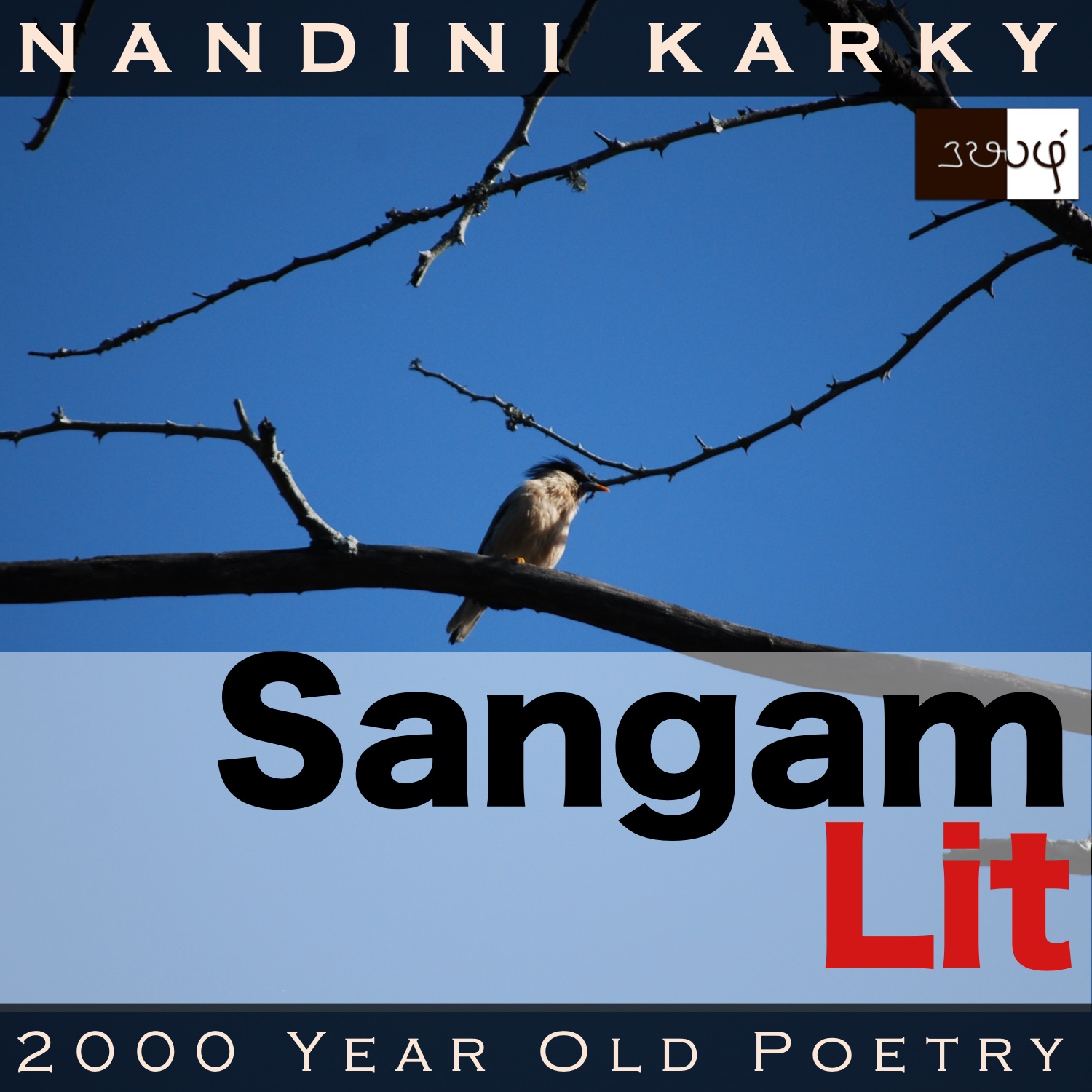Podcast: Play in new window | Download
Subscribe: Apple Podcasts | Spotify | Amazon Music | Android | iHeartRadio | TuneIn | RSS | More

In this episode, we perceive scenes from nature echoing the lady’s emotions, as depicted in Sangam Literary work, Kurunthogai 154, penned by Madurai Seethalathai Saathanaar. The verse is situated in the drylands of ‘Paalai’ and speaks in the voice of the lady to her confidante, expressing her inability to bear with the man’s parting.
யாங்கு அறிந்தனர்கொல்- தோழி! – பாம்பின்
உரி நிமிர்ந்தன்ன உருப்பு அவிர் அமையத்து,
இரை வேட்டு எழுந்த சேவல் உள்ளி,
பொறி மயிர் எருத்தின் குறு நடைப் பேடை
பொரிகாற் கள்ளி விரிகாய் அம் கவட்டுத்
தயங்க இருந்து, புலம்பக் கூஉம்
அருஞ் சுர வைப்பின் கானம்
பிரிந்து, சேண் உறைதல் வல்லுவோரே?
‘How can he?’ is the question that throbs at the core of this verse! The opening words ‘யாங்கு அறிந்தனர்கொல்’ meaning ‘how did he learn that?’ gives us a hint about the puzzling behaviour of another person. Next, a curious object in nature catches our attention in ‘பாம்பின் உரி’, referring to ‘a snake’s shed skin’. Following this, the focus turns to ‘a male bird that rises to go in search of food’ in ‘இரை வேட்டு எழுந்த சேவல்’. Isn’t it curious how even among the bird species, the Sangam folks describe the male as the provider? If the male bird appears, can the female be far behind? Sure enough, ‘the female, which hops with short steps’ greets us in ‘குறு நடைப் பேடை’. After all this talk of animals, there’s mention of a plant in ‘பொரிகாற் கள்ளி’ meaning ‘a cactus with a cracked trunk’. Ending with the words ‘சேண் உறைதல் வல்லுவோரே’ meaning ‘the one who has the ability to stay far away’, the verse welcomes us within to explore more.
What do these male and female birds have to say about the inner world of the lady? The context reveals that the man and lady were leading a happy, married life, when the man parted away to gather wealth. The lady languishes in his absence and one day, turns to her confidante and says, “How did he gain that knowledge, O friend? Akin to a snake’s shed skin lifting up, the heat spreads. At this time, thinking of the male that went in search of food, the female bird with spotted hair on its neck and a short-stepped gait, leans on the beautiful branch of a cactus, with a parched trunk and cracked fruits, and cries out in loneliness in that difficult-to-cross drylands jungle. Indeed, how does he know? He, the one who has parted from me and is capable of living far away!” With these words, the lady conveys her incredulity at how the man could so easily stay away, when she herself was suffering in loneliness.
Here’s but a little scene in the man’s path and how does the lady manage to conceal her emotions there? Let’s follow her words closely to unravel the hidden meaning. The lady starts with a single question about the man, wondering about how he learnt to do something. What could ‘something’ mean here? After that question, the lady transports us to a drylands region, by describing how the heat seems to pour down like a snake’s shed skin. What a nuanced comparison this is, will become clear to you, with an image search for a shed snake skin. The blinding white colour and the crisscross pattern will remind you of light rays in a hot, dry place. Moving on, the lady then talks about a female bird, which has a spotted, soft tuft of hair around its neck and walks in short strides. She tells us, at that moment, the female bird is thinking about its mate that had gone to hunt for food, and perched on the cactus branch, it coos in loneliness in that very path the man is walking through. This is the moment the lady turns to her friend and asks, ‘how can he walk unaffected by this bird’s lament and continue to stay away without returning to me?’
Taking her thoughts, the lady projects these on the female bird in the drylands forest. The scene is a metaphor for her own feelings of missing her man, who had gone in search of wealth. At the same time, this scene is something that could be really happening in the man’s path and that’s what makes the lady wonder how he can go on, when listening to this birdsong, without thinking of her and without wanting to return immediately to her. The expression of these emotions would hopefully bring relief to the pining lady and would also make the confidante render consoling words to her friend. In love, isn’t there a constant question of whether the other is feeling the same that one is feeling? This verse presents a different way of asking that evergreen question that throbs in any heart in love.




Share your thoughts...